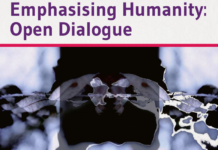Psychiatrist Tom Stockman has been posting a series of articles on his blog Mandala, reflecting on the Open Dialogue method for intervening in psychiatric crises. Stockman recently participated in an Open Dialogue training program, and discusses the history and research behind the method as well as current developments around the world to investigate and practice it more.
“Open Dialogue was developed in Finland in the 1980’s for the treatment of acute mental illness, such as psychosis,” writes Stockman. “It involves a consistent family/social network approach to care, in which the primary treatment is carried out via meetings involving the patient together with his/her family members and extended social network. Since its original inception in Western Lapland, Open Dialogue has spread across much of Scandinavia, as well as Germany, Poland, and several US States. New York recently invested $50 million in an Open Dialogue service, and Massachusetts Medical School has established a Masters degree in Dialogic Practice. The variant used in New York integrates peer workers into the model, and has come to be known as Peer-supported Open Dialogue (POD).”
“Open Dialogue has been found to be significantly superior to normal treatment of acute psychosis,” writes Stockman. “After 5 years (1992 – 1997) of Open Dialogue treatment in Tornio, Lapland, 81% of people had no remaining psychotic symptoms and 81% had returned to full employment. Only 35% had used antipsychotics (Seikkula et al., 2006). In the UK, only 20% of people with ‘schizophrenia’ would be expected to be symptom free after 5 years, with close to 100% of all patients with psychosis receiving antipsychotics.”
On Open Dialogue Part 1: Introduction (Mandala, December 6, 2014)














